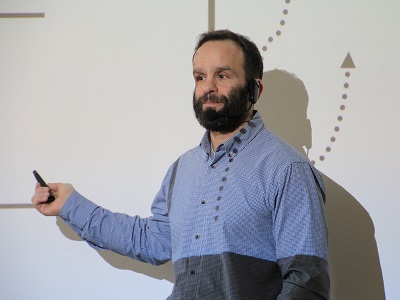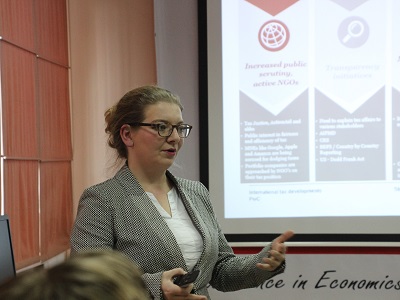Did you know what Georgia produces most and what is the share of its production worldwide? Wine and copper seem the obvious answers – but these would be wrong. The answer is, in fact, cryptocurrency: 15% of all Bitcoins in the world are mined in Georgia, perhaps a disproportionate figure given the country’s small size. On December 4, Andrew Thornhill, a co-founder of Spotcoin, gave a lecture at ISET entitled “What is Bitcoin and why will it change the world”.
Mr. Thornhill has built high volume payment networks on three continents, and more than one billion dollars of payments have cycled through Andrew’s networks. Leveraging his vast experience, he is now concentrating fully on the digital currency ecosystem. ISET was very fortunate to host such an authoritative speaker on cryptocurrency.
On November 22, President of ISET and ISET-PI, Mr. Eric Livny gave an insightful presentation to the very first cohort of ISET BA Program students, regarding the importance and perks of coordination.
Mr. Livny opened his speech with a famous quote by Adam Smith, and then discussed whether it is always enough for the match of Supply and Demand that “it is not from the benevolence of the butcher, the brewer, or the baker that we expect our dinner, but from their regard to their own interest”. Mr Livny stressed that “chicken and egg” problems frequently hinder the process of metaphorically delivering a dinner to a consumer’s table from the butcher due to a lack of coordination between the two; this is keenly felt in economics, and Mr. Livny explained the necessity for the World Bank to develop well-organized and managed Value Chains in Georgia.
On October 20, members of the ISET community attended a guest lecture on international taxation from Ms. Femke van der Zeijden from PricewaterhouseCoopers Netherlands’ office. Ms. Zeijdenhas introduced issues of international taxation from legal perspective. This was particularly useful and interesting for the audience as it primarily consisted of economists, for whom the legal aspects and problems of different taxation policies are not well known.
Ms. Zeijden tailored her lecture to show the challenges in international taxation coming from development of information technologies. Specifically, the lecture touched upon the following four important directions which present the most significant challenges: (i) Globalization, (ii) Digitalization, (iii) Transparency and (iv) Multinational corporations.













